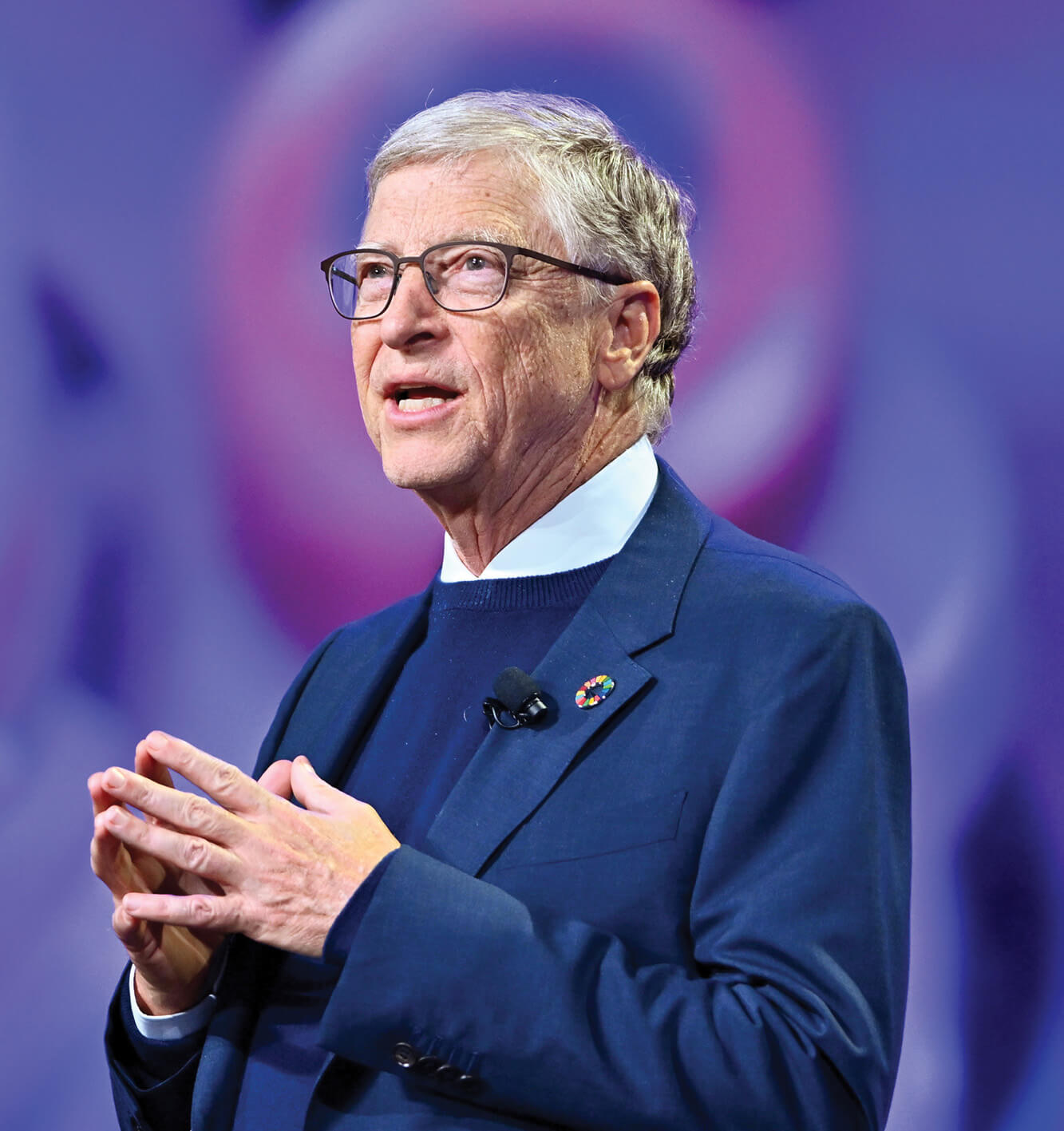Q&A with Bill Gates
“ALL THE GOOD THINGS YOU HEAR ABOUT AI, AND THE THINGS TO WORRY ABOUT, ARE ABSOLUTELY CORRECT.”
— BILL GATES, 69, TALKS ABOUT HIS JOURNEY FROM REBELLIOUS KID TO MICROSOFT COFOUNDER, AND HOW AI WILL CHANGE OUR LIVES

What motivated you to write your memoir, Source Code (the first of three volumes), now?
Microsoft’s now 50 years old, and still going strong, amazingly. So I’ve been thinking back, how did Microsoft happen? I think I owe a lot to the time I was born, having the parents I had.... It’s kind of a fun story: Growing up in the place I did [Seattle] and at the time I did was pretty fantastic.
Sounds like you were a challenge for your parents as a kid.
I was pretty much questioning rules as kind of arbitrary. Who came up with these rules, you know? It was mostly when I was 10 to 12, when I would challenge my parents’ thinking—even though, in retrospect, they were quite amazing parents. My dad actually wrote a book called Showing Up for Life. And his values, his approach, were pretty amazing. And my mom was ambitious for me, which both bothered me and helped me. I didn’t want to do things just to vindicate her. But then I kind of did. So she and I had some tension. Even when I was starting Microsoft, she was still sort of acting like I was living at home.
Do you think you might have been diagnosed as being on the spectrum if you were a kid today?
My social skills, particularly with peers, were a little slower to develop, and I did kind of get obsessed with things. But I probably would have been diagnosed with ADHD, just because of my intensity and energy. I remember in grade school, there was one teacher who said I should skip a grade, and then another teacher told me I should be held back a grade.
But as a teen you were sneaking out in the middle of the night to do computer coding, right?
That was less about being rebellious [than] about how darn interesting it was. Software was kind of this magical thing, because the microprocessor was going to take software from something that’s just an afterthought—because hardware was everything, then—to something even more important.
There’s lots of talk about how artificial intelligence is going to change the world. How do you view AI?
What AI means—and this will sound weird, but it’s the best way to think of it—is that intelligence almost becomes free. For example, if you were in a meeting with a doctor, and they said complicated things, the idea is that the AI sits in that doctor-patient meeting, and then it’s available to talk with you. It can explain your medical bill, it can explain that MRI outcome. It’s almost like getting free white-collar workers. It’s still not totally reliable, but that’s being worked on, and people shouldn’t assume that that won’t get fixed. We also have to think about how do we deal with somebody who’s got ill intent, who’s using this tool for a cyberattack, or somebody who’s trying to defraud. Some of these scams, which are bad enough without AI, become even more effective if you have AI tools.... So all the good things you hear about AI and most of the things to worry about are absolutely correct.
Is this the best time in history to be 50 or older?
Oh, certainly, by a long shot. You know, 20 years from now will be even better. I’ve met with Alzheimer’s researchers, and these new medicines—particularly if we figure out how to use them early on—are very promising. I saw my dad face Alzheimer’s, and it affected his last years a lot. I hope that there’ll be fewer people having to go through that.
You’ll be 70 in October. How are you changing with age?
I have to say, I’m enjoying these years as much as even those incredible years in my early life: The Microsoft years were incredible. And now, these older years, where my work is mostly foundation focused, are pretty incredible. I would not have guessed when I was young that this part of my life would be as fun or engaging. I take a lot more time off than I did in my 20s and 30s—I was pretty monomaniacal—but I still work pretty long hours. With the kinds of things the foundation does, we can save millions of lives if we do it the right way.
What about staying physically fit?
I’m lucky enough to be healthy, but you need to invest in that, which I never did until I was 60. Fortunately, I enjoy playing tennis and pickleball quite a bit, so I get about half of my exercise in a form that’s purely fun. It’s exercise I would do even if it didn’t benefit me.
Are you optimistic about the future?
Overall, yes, I’m very optimistic, because I get to be involved in incredible innovation, whether it’s reducing the damage of Alzheimer’s or even preventing Alzheimer’s, or ways we’ll deal with cancer or the various diseases that are worse in poor countries or climate change or education. This pace at which we’re going to improve our health and be able to have what’s like a personal tutor, those are really good things. But, you know, it’s not like it happens automatically. We have to figure out how to trust each other and work together in order to reap the benefits of these innovations. I hope we will. I believe we will.
—Interview by Christina Ianzito
ROY ROCHLIN/GETTY IMAGES